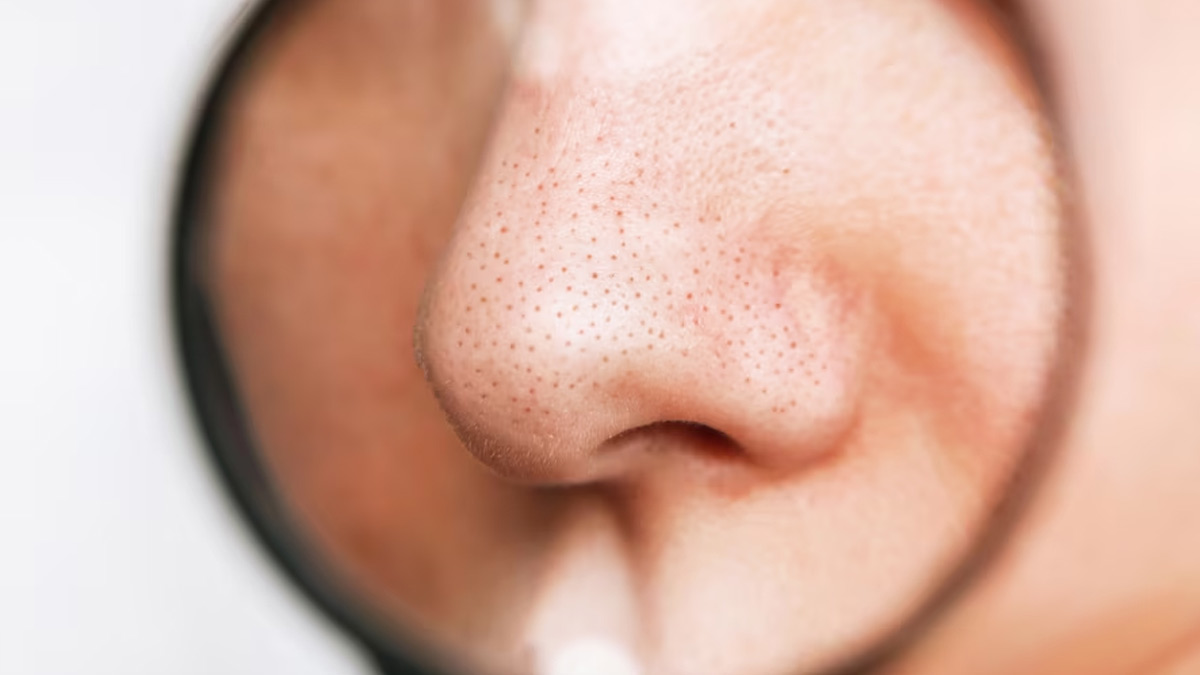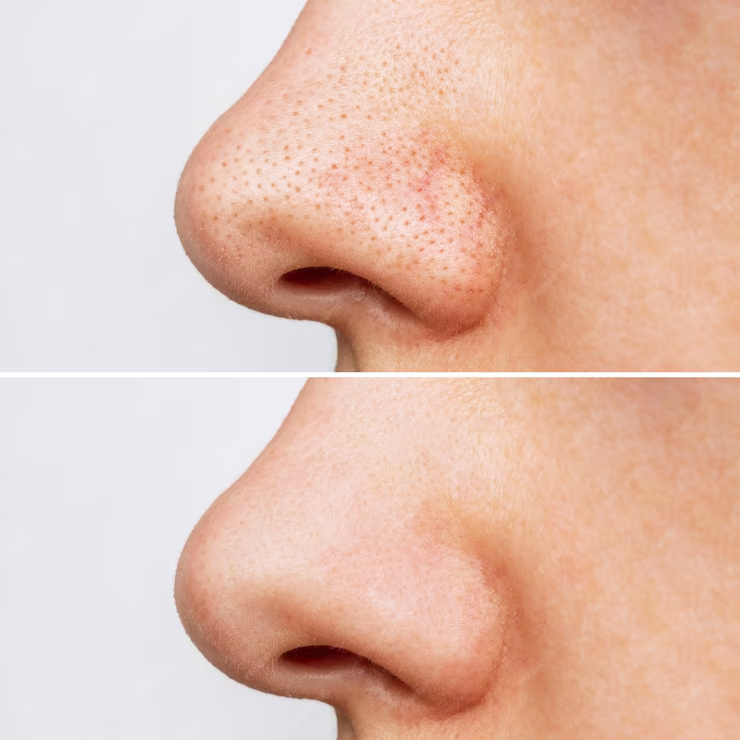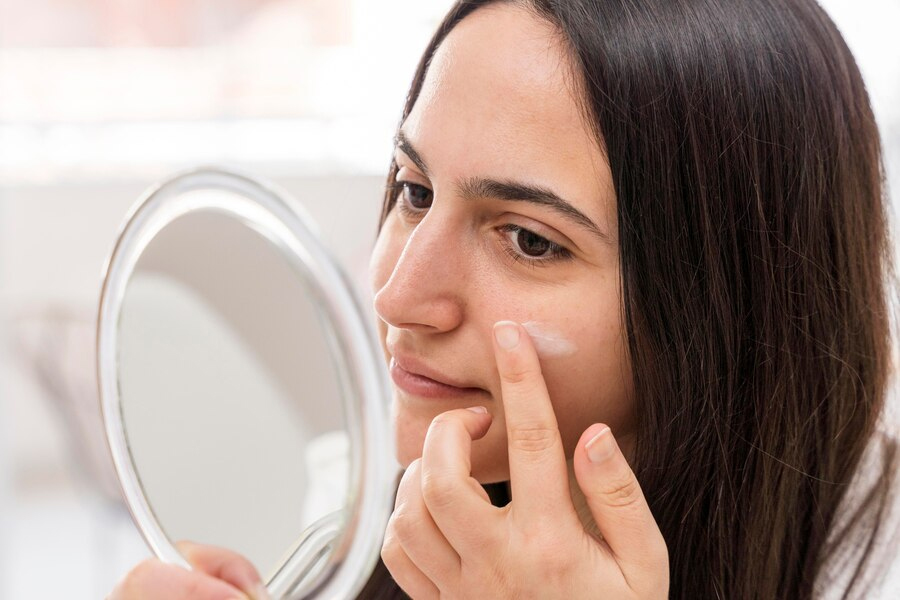
While rainfall has provided some relief from extreme heat, intense humidity has become a problem for many. Not only does it affect body temperature, but excessive sweating due to humidity can also make a person lose too much water and electrolytes, leading to health problems like dehydration, fatigue, and cramps. Additionally, it can also impact the skin, leading to excess sebum or oil production and causing the pores to expand. To find a solution, the OnlyMyHealth team interacted with Dr N. Bhavana, Consultant Dermatologist, CARE Hospitals, Banjara Hills, Hyderabad.
Table of Content:-
What Causes Enlarged Pores?

Pores are tiny openings in the skin that produce oil and sweat from the glands. Open or enlarged pores occur due to excessive sebum production, which can mix with sweat and clog pores. When these pores become clogged with oil and debris, they can appear larger, explains Dr Bhavana.
Other factors that can cause the pores to expand include the use of comedogenic products, which include substances that increase the risk of clogged pores, blemishes, and blackheads.
In certain cases, where a person has dry skin, the skin can become tight and irritated, which might make pores more noticeable.
Keeping all of these factors in mind, Dr Bhavana shares what type of ingredients you should be looking for in your skincare products to minimise and reduce pores.
Skincare Ingredients To Reduce Enlarged Pores

According to the doctor, the choice of skincare ingredients can vary depending on your skin type. To minimise pores, here are some general recommendations, as per different skin types:
Oily skin
- Salicylic acid: An exfoliant that penetrates pores to remove excess oil and debris.
- Niacinamide (Vitamin B3): Reduces sebum production and minimises pore appearance.
- Clay: Absorbs excess oil and helps unclog pores.
Dry skin
- Hyaluronic acid: Hydrates the skin, preventing dryness that can clog pores.
- Glycolic acid: A gentle exfoliant that removes dead skin cells and promotes cell turnover.
- Ceramides: Strengthen the skin barrier and retain moisture.
Combination skin
- Retinoids: Promote cell turnover and unclog pores.
- Alpha Hydroxy Acids (AHAs): Exfoliate and help balance oil production.
Sensitive skin
- Lactic acid: A gentle exfoliant suitable for sensitive skin.
- Green tea extract: Soothes and reduces inflammation.
- Azelaic acid: Reduces inflammation and helps keep pores clear.
Also Read: Korean Skincare Routine: Why It May Not Suit Indian Skin Type?
Expert-Recommended Skincare Routine To Minimise Pores

In addition to using proper skincare products, our expert recommends following a healthy skincare routine to reduce pores. This include:
Morning routine
- Use a gentle cleanser to remove overnight oil and impurities. For oily skin, a foaming cleanser with salicylic acid can be beneficial. For dry or sensitive skin, a hydrating cleanser is preferable.
- Apply a toner to balance the skin’s pH and remove any leftover impurities. Look for toners with ingredients like witch hazel for oily skin or rose water for dry or sensitive skin.
- Use a serum with niacinamide to reduce sebum production and minimise pores. For dry skin, a hydrating serum with hyaluronic acid can be helpful.
- Choose a lightweight, non-comedogenic moisturiser. Gel-based moisturisers are great for oily skin, while cream-based moisturisers work well for dry skin.
- Apply a broad-spectrum sunscreen with at least SPF 30. Sunscreen protects the skin from UV damage, which can worsen pore appearance.
Evening routine
- Cleanse your face to remove makeup, oil, and pollutants. Double cleansing (using an oil-based cleanser followed by a water-based cleanser) can be effective for thorough cleaning.
- Exfoliate 2-3 times a week with a chemical exfoliant (like salicylic acid for oily skin or glycolic acid for dry skin) to remove dead skin cells and prevent clogged pores.
- Use a toner to prepare the skin for the next steps in your routine.
- Apply treatments like retinoids or AHA/BHA serums to promote cell turnover and unclog pores. Start with a lower concentration if you have sensitive skin.
- Use a moisturiser suitable for your skin type to maintain hydration.
- If you have any active breakouts, use a spot treatment with benzoyl peroxide or salicylic acid.
Conclusion
If you have large pores, you're likely to experience more episodes of skin infections and acne. While they are benign, it is always beneficial to consult a dermatologist to understand the underlying cause. Additionally, by following a consistent skincare routine and choosing products tailored to your skin type, you can effectively minimise the appearance of enlarged pores and maintain healthy, clear skin, concludes Dr Bhavana.
Also watch this video
How we keep this article up to date:
We work with experts and keep a close eye on the latest in health and wellness. Whenever there is a new research or helpful information, we update our articles with accurate and useful advice.
Current Version